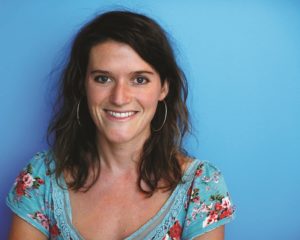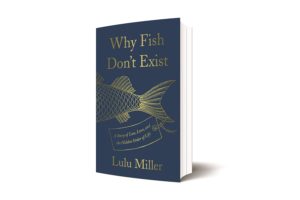Lulu Miller calls David Starr Jordan, the protagonist of her book Why Fish Don’t Exist: A Story of Loss, Love, and the Hidden Order of Life, “David.” Born in the middle of the 19th century, Jordan learned to channel his love for the natural world into biological nomenclature — Linnaean classification. He developed a passion for fish. He traveled the world to study sea creatures, eventually identifying and naming more of them than any other researcher before or since. Given that Miller’s gorgeous nonfiction essay is, in part, a footnoted history of scientific taxonomy, her choice is telling: why does she call her subject by his first name?
Part of the answer to this question is that Miller, emotionally and epistemologically at sea, identifies Jordan as a personal anchor. She explains that, on vacation in Wellfleet at the age of seven, standing in a marsh, she asked the scientist father she adored the meaning of life: “My dad paused, raising one black eyebrow behind the binoculars. Then he turned to me grinning and announced, ‘Nothing!’ ” He explained that “there is no meaning of life. There is no point. There is no God. No one watching you or caring in any way. There is no afterlife. No destiny. No plan … the truth is, none of this matters, and you don’t matter.”

Though her kind and quirky father’s vision inspired a “voracious hedonism” in him, for Miller it led to depression and a sense of futility. In high school, she began cutting herself and eventually attempted suicide in her family’s basement.
Miller emerged into adulthood as an accomplished science writer with a failed relationship and a broken heart. She latched onto an incident in the life of the scientist she chooses to call “David” to help her find her way. The 1906 San Francisco earthquake sent thousands of jars of specimens in formaldehyde in Jordan’s Stanford University lab crashing to the ground, separating fish bodies from fish name tags. The entirety of David Starr Jordan’s life’s work lay in disarray.
“It is now that I would have given up,” Miller writes, alluding to her previous attempts at self-harm. “So what does David do? What does our careful man of science, who wants above all else to see the world for what it is, do? Does he hear what seems to be the obvious message of the earthquake? That entropy is the way of the world and no human can ever stop it? Nope. This is when the bastard, the wonderful bastard, takes out his sewing needle and plunges it straight into our ruler’s throat.”
Jordan stitched tags onto named fish, re-imposing order on the God of Chaos. Miller wants to internalize this scene, to let it serve as a life-shaping parable. But her relationship with her subject is unstable. As she follows the twists and turns of Jordan’s relentlessly optimistic if misguided life — and chronicles her own pilgrim’s progress along the way — Miller struggles to admire, let alone respect, the man she calls David or the science he espoused.

Miller may also have been inclined to refer to her subject by his first name because of the substantial body of work she has created with Jad Abumrad and Robert Krulwich for Radiolab, the program produced at New York City public radio station WNYC that describes itself as “investigating a strange world.” Radiolab’s narrators adopt a jovial, casual tone as they tackle what can be esoteric subjects. Echoes of the show’s forced jokiness and distracting, rhetorical repetitions show up in Miller’s writing and might have made her partial to dubbing Jordan “David.” But in the book, Miller cannot incorporate the cheap audio editing tricks Radiolab uses to interrupt and disjoint. She makes the best of her training as a master storyteller and embraces her well-honed sense of the ridiculous as she gallops through the ideas of Charles Darwin and Louis Agassiz, eugenics, the pitfalls of positivity, cladistics, and accounts of exploring archives, climbing mountains, visiting former asylums, and swimming in the Caribbean. At no point does her narrative ever descend into pointless digression.
Miller’s father’s worldview may have given her too much power too early in her life to doubt herself into depression. But it is possible that her father’s admonition to keep going in the face of chaos — even though nothing matters — may also have unshackled Miller from a need to ask permission or seek approval. It is her birthright to unleash her curiosity wherever she pleases. That she is brave enough to write so beautifully as she works to identify answers she finds satisfying, logical, and affirming is an accomplishment she must claim as her very own.



